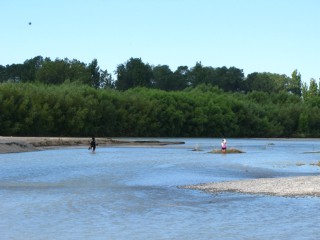I want to...
Current filter: Most popular
A to Z
Apply for a job
Biosecurity
Consents
Consultation
Contact Us
Environmental Data
Farmers Hub
Fix it or Report it
Information Request
Join an Event
Leasehold Land
Meetings
Rates
Water Metering
Have Your Say
Ngaruroro Water Conservation Order
Published: 11 February 2016

Thursday February 11, 2016
James Palmer, HBRC’s Group Manager Strategic Development, says it’s premature to consider a Water Conservation Order or WCO application for the Ngaruroro and Clive Rivers while a planning process is already under way in this catchment.
Mr Palmer indicates that Council does not oppose the consideration of a Water Conservation Order per se, but poses the question of timing and the best process.
“HBRC agrees it is necessary to protect the outstanding values of some parts of the Ngaruroro River and believes this will happen through the current TANK planning process. By law we are required to protect significant values of outstanding water bodies in the region, so the WCO will duplicate effort for local communities and the council but in a process that is not locally driven,” he adds.
TANK is HBRC’s name for the Plan Change project working collaboratively with a wide group of stakeholders. The TANK group’s goal is to set limits, measures and a monitoring regime to manage water resources in the Tutaekurī, greater Ahuriri, Ngaruroro and Karamū catchments – where approximately 80% of the Hawke’s Bay population live and work.
Mr Palmer says the current application includes lower parts of the Ngaruroro, the Clive River and associated groundwater, so would also affect the Tutaekurī River and Karamū stream, all operating in a connected system.
“As it’s written, the application impacts on significant cultural, social and economic values over a very wide area - a space where Council has already started an integrated, holistic approach through the TANK planning process,” adds Mr Palmer.
HBRC developed a surface-groundwater model for the Tukituki catchment and is taking the same approach for TANK, to help determine what controls on water use are needed to meet the community’s objectives and protect important values. The model will be ready later this year.
The TANK stakeholder group began its collaborative process in 2012, but progress has been frustrated by the availability of scientific information.
“We’re concerned that a WCO process will complicate TANK’s current work programme, undermine the group’s work by pre-empting their deliberations, and duplicate efforts. Worst still such a WCO would be considered without the necessary groundwater science to back it up,” concludes Mr Palmer.
While HBRC’s Regional Planning Committee is asking the Minister for the Environment to decline this application, it considers that a future application to reinforce recognition of the outstanding values identified through the TANK process could be made once the plan change process has completed.
Disclaimers and Copyright
While every endeavour has been taken by the Hawke's Bay Regional Council to ensure that the information on this website is
accurate and up to date, Hawke's Bay Regional Council shall not be liable for any loss suffered through the use, directly or indirectly, of information on this website. Information contained has been assembled in good faith.
Some of the information available in this site is from the New Zealand Public domain and supplied by relevant
government agencies. Hawke's Bay Regional Council cannot accept any liability for its accuracy or content.
Portions of the information and material on this site, including data, pages, documents, online
graphics and images are protected by copyright, unless specifically notified to the contrary. Externally sourced
information or material is copyright to the respective provider.
© Hawke's Bay Regional Council - www.hbrc.govt.nz / +64 6 835 9200 / info@hbrc.govt.nz


